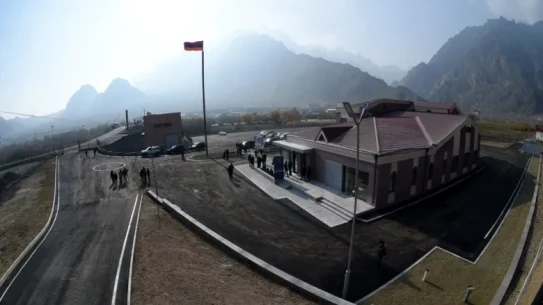"In the presence of a weak political infrastructure and the absence of an efficient management system, the disruption or collapse of the country's economic life can lead not only to social and political problems, but also to the danger of the collapse of the state", writes former SRC chairman Davit Ananyan and elaborates.
"The analysis of some of the factors and indicators listed below indicates the possible vulnerability of our country's economy and the lack of guarantees for the long-term economic and political future.
1. Predominance of the non-exportable sector in the GDP, in conditions of limited domestic gross consumption. The sectors providing economic growth in the GDP structure are the non-exportable sectors aimed at satisfying domestic consumption (trade, services, construction, etc.).
The low level of domestic consumption in a country with a small and low-purchasing population limits the market and opportunities for economic growth. Such a situation makes the economy unstable and resistant to internal and external shocks.
2. Lack of developed industry. The main "traditional" exportable sector of the economy is mining, which accounts for 3-4% of GDP. At the same time, the manufacturing industry accounts for 11-13% of the GDP, the rate of development of which mainly depends on external factors, in particular, temporary re-export opportunities. The presence of an underdeveloped industrial base, a re-export factor and "mineral" exports increase the dependence and vulnerability to fluctuations in world prices of raw materials, while at the same time testifying to the weakness of domestic production.
3. Negative foreign trade balance. 2024 The negative foreign trade balance for eight months was 2.3 billion US dollars. A significant foreign trade deficit indicates the country's dependence on imports and, by and large, leads to a drain on foreign exchange reserves, which increases financial risks.
4. High level of debt. State debt in 2024 as of the end of August is 12.5 billion US dollars or 51% of the GDP (it is predicted that it will grow to 55% by the end of 2027). The high level of public debt to GDP indicates the existence of a significant debt burden, which limits the opportunities for infrastructure development and investment in social programs.
5. Low investment in research and development (R&D) and technological advancement. The level of investment in R&D and technological development in our country is extremely low, which limits the innovative potential and competitiveness of the economy, negatively affecting long-term growth prospects.
6. Very low level of economic diversification. Diversification of the economy in the "qualitative" sense, in fact, does not exist. Lack of diversification increases the risks associated with an economy's dependence on a few key sectors. The lack of such diversification makes the economy more sensitive to external and internal shocks.
7. Low-quality state administration and institutions. The quality of public institutions and public administration is extremely low, which affects the country's ability to sustain internal development and withstand external shocks. Weak state institutions limit the effectiveness of economic policy and the ability to manage the process to respond to challenges and maintain stability. Thus, our country's economy is vulnerable due to a limited domestic market, high dependence on imports and debt, a weak industrial base and low investment in technology. Low levels of research and development (R&D) investment and the lack of "qualitative" diversification of the economy limit potential sources of long-term sustainable growth.
In the conditions of political instability, the high level of public debt and the poor quality of governance can lead to economic and social collapse, which in turn creates risks not only for political stability, but also for the future of the state."


